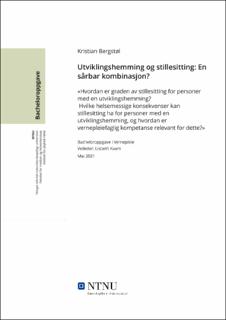| dc.contributor.advisor | Kvam, Lisbeth | |
| dc.contributor.author | Bergstøl, Kristian | |
| dc.date.accessioned | 2021-09-25T16:45:35Z | |
| dc.date.available | 2021-09-25T16:45:35Z | |
| dc.date.issued | 2021 | |
| dc.identifier | no.ntnu:inspera:81471222:24433035 | |
| dc.identifier.uri | https://hdl.handle.net/11250/2783467 | |
| dc.description.abstract | Tittel: Utviklingshemming og stillesitting: En sårbar kombinasjon?
Problemstilling: Hvordan er graden av stillesitting for personer med en utviklingshemming?
Hvilke helsemessige konsekvenser kan stillesitting ha for personer med en utviklingshemming, og hvordan er vernepleiefaglig kompetanse relevant for dette?
Nøkkelord: Stillesitting, utviklingshemming, helse, konsekvenser, kompetanse, vernepleie
Introduksjon/bakgrunn: Helsedirektoratet inkluderte for første gang i 2014 en anbefaling om å redusere stillesitting. Stillesitting kan ses på som en utfordring i samfunnet generelt, men fokuset i oppgaven er satt på personer med utviklingshemming spesielt, da vernepleieren er en viktig ressurs i habiliteringsarbeid. Forekomsten av helsesvikt er større hos personer med en utviklingshemming enn i befolkningen ellers, samtidig som grad av stillesitting også er større hos personer med en utviklingshemming.
Hensikt: Hensikten med oppgaven er å undersøke grad av stillesitting hos personer med en utviklingshemming, samt hvilke helsemessige konsekvenser stillesitting har. Hensikten er også å se på hvordan vernepleiefaglig kompetanse er relevant.
Metode: Litteraturstudie. Oppgaven benytter seg av fem kvantitative forskningsartikler, samt annen relevant litteratur.
Resultat: Forskningsartiklene inkludert i denne oppgaven viser at personer med en utviklingshemming bruker relativt store deler av dagen stillesittende. Samtidig legger artiklene til grunn helsemessige konsekvenser ved stillesitting, og ser at fokus på stillesitting som tema er viktig for videre forskning og folkehelse.
Konklusjon: Litteraturstudien konkluderer med at det er kjente helsemessige konsekvenser knyttet til stillesitting. Personer med en utviklingshemming har generelt sett høyere grad av stillesitting enn personer uten en utviklingshemming. Samtidig ser vi at personer med en utviklingshemming har større grad av helsesvikt enn resten av befolkningen. Livsstilsrelaterte sykdommer er en viktig årsak til helsesvikt hos personer med en utviklingshemming. Demografiske variabler har ingen signifikant betydning. Vernepleierens helsefaglige, pedagogiske, og sosiale kompetanse kan vise seg å være sentral i arbeidet rundt dette tema. | |
| dc.description.abstract | Title: Intellectual disability and sedentary behaviour: A vulnerable combination?
Thesis Statement: How is the sedentary behaviour for people with intellectual diabilities?
What health consequences can sedentary have for people with a intellectual disability, and how is social care expertise relevant to this?
Keywords: Sedentary, intellectual disability, health, consequences, competence, social care expertise
Introduction/Background: For the first time in 2014, the Norwegian Directorate of Health included a recommendation to reduce sedentary behaviour. Sedentaryness can be seen as a challenge in society in general, but the focus of the task is placed on people with intellectual disabilities in particular, as the social educator is an important resource in habilitation work. The incidence of health failure is greater in people with a developmental disability than in the general population, while the degree of sedentary sitting is also greater in people with a developmental disability.
Purpose: The purpose of the thesis is to investigate the degree of sedentary behaviour in people with a developmental disability, as well as the health consequences of sedentary sedentary behavior. The purpose is also to look at how social care expertise is relevant.
Method: Literature study. The thesis uses five quantitative research articles, as well as other relevant literature.
Result: The research articles included in this paper, show that people with an intellectual disability spend relatively large parts of the day sedentary. At the same time, the articles assume the health consequences of sedentary behaviour, and see that the focus on sedentary as a topic is important for further research and public health.
Conclusion: The literature study concludes that there are known health consequences associated with sedentary behaviour. People with a intellectual disability generally have a higher degree of sedentary behavior than people without an intellectual disability. At the same time, we see that people with a intellectual disability have a greater degree of health failure than the rest of the population. Lifestyle-related diseases are a major cause of health failure in people with a intellectual disability. Demographic variables have no significant outcome. The social educator's health, educational, and social competence may prove to be central to the work on this topic. | |
| dc.language | nob | |
| dc.publisher | NTNU | |
| dc.title | Utviklingshemming og stillesitting: En sårbar kombinasjon? | |
| dc.type | Bachelor thesis | |
